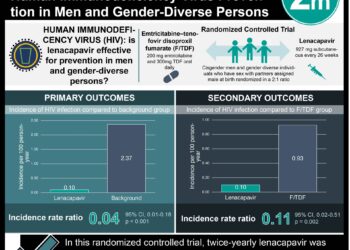Peer-delivered education through social networking increases home-based HIV testing
Image: PD
1. In this randomized controlled trial, peer-led education concerning human immunodeficiency virus (HIV) using social media interactions increased use of home-based HIV testing among African American and Latino men who have sex with men (MSM).
Evidence Rating Level: 1 (Excellent)
Study Rundown: Over 80% of HIV cases are MSM. In particular, African American and Latino of this orientation have high rates of new diagnoses. Community-based peer intervention has historically been effective at decreasing behaviors that increase the risk of HIV transmission. This study investigated the effectiveness of providing this type of intervention using the social networking site Facebook. A population of mostly African American and Latino men was recruited and randomly assigned to a control or intervention Facebook group. Peer leaders in the control group provided only general health information, whereas HIV-specific education was offered in the intervention group. Throughout the trial, each participant was offered a free, home-based, HIV testing kit. Individuals who randomized to the intervention group were more likely to request and return the testing kits, as well as follow-up on the results, when compared to controls. However, the low number of participants in the study did not allow for rigorous statistical analysis, despite a high 12-week retention rate. Additionally, the nature of using peer trainers introduced a high degree of variability in message content, making it difficult to generalize the impact of this intervention style. Nevertheless, this study provided evidence that social media may be an effective tool in the prevention and diagnosis of HIV in this patient population.
Click to read the study, published today in the Annals of Internal Medicine
Relevant Reading: Effects of an Internet-based intervention for HIV prevention: the Youthnet trials
In-Depth [randomized, controlled trial]: This trial recruited 112 MSM subjects based in Los Angeles, California. The participants in the trial were 27.7% African American and 59.8% Latino. The subjects were recruited online, and mostly through paid banner advertising. The subjects were randomized into either control (n=55) or intervention (n=57) groups, which were subdivided into two clusters, each supervised by 4 peer leaders. These leaders were encouraged to engage in general conversation and either discuss HIV prevention and testing (intervention) or the importance of exercise, healthy diet, and decreasing stress (control). The primary endpoint studied was the participants’ request and use of a free, home-based HIV test that was offered every 4 weeks. In the intervention group, 43.9% (vs. 20% control) requested a kit, 15.8% (vs. 3.6% control) returned it, and 14.0% (vs. 0% control) followed-up on the results. Secondary endpoints studied were change in the number of sexual partners and online engagement.
The intervention group was found to be associated with a median decrease of 2 compared to a decrease of 1 in the control group. In terms of online engagement, the intervention group was found to be associated with increased messages and chats when compared to the control group. The retention rate for this study was high (93.8%). However, a major limitation of this study was the low number of participants. This prevented the use of statistical analysis to indicate any significant effect. Additionally, the peer leaders were instructed to tailor their interactions to the group, making future standardization or generalization of this intervention difficult.
By Sai Folmsbee and Aimee Li, MD
More from this author: Combination therapy with tofacitinib improves response in rheumatoid arthritis USPTF recommends tobacco counseling for adolescents by primary care physicians
© 2013 2minutemedicine.com. All rights reserved. No works may be reproduced without expressed written consent from 2minutemedicine.com. Disclaimer: We present factual information directly from peer reviewed medical journals. No post should be construed as medical advice and is not intended as such by the authors, editors, staff or by 2minutemedicine.com. PLEASE SEE A HEALTHCARE PROVIDER IN YOUR AREA IF YOU SEEK MEDICAL ADVICE OF ANY SORT.







